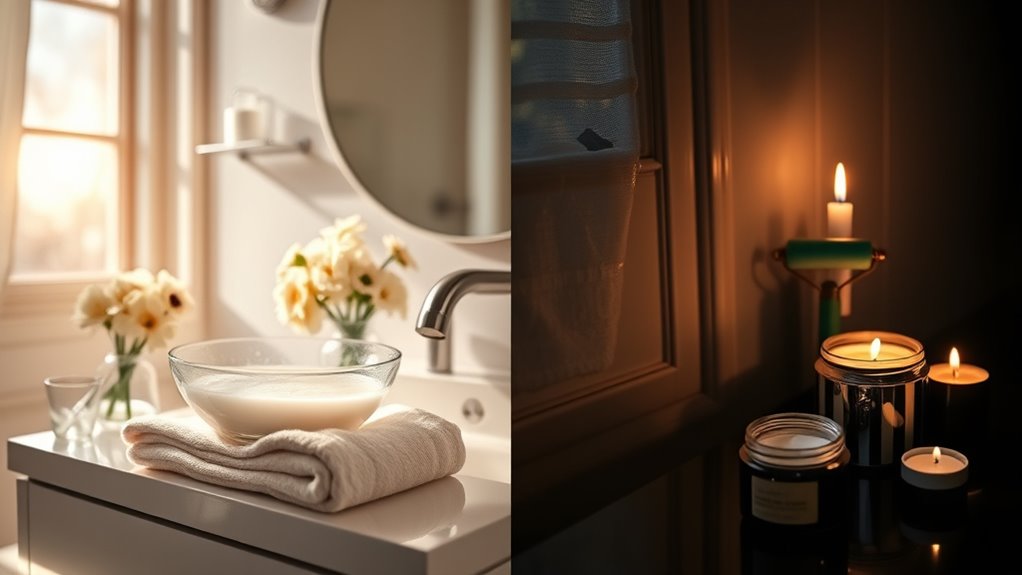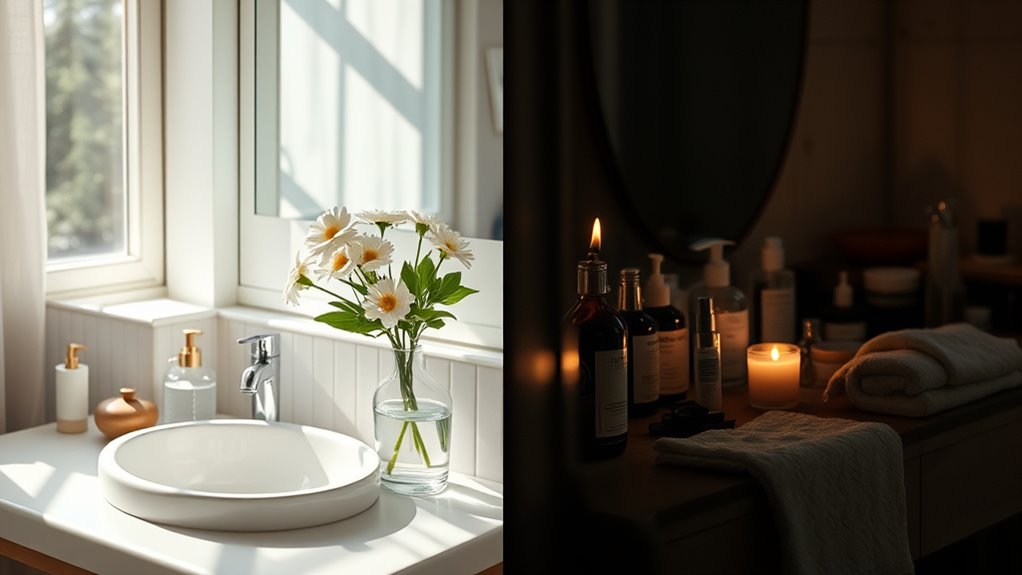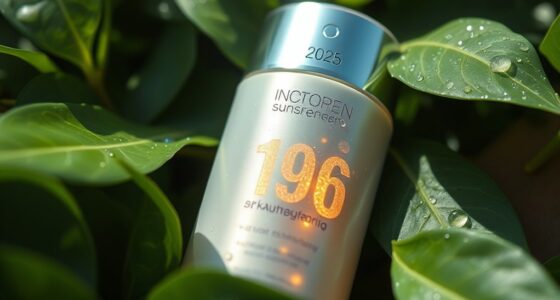In your morning skincare routine, focus on protecting your skin from environmental damage by applying antioxidants, serums, and broad-spectrum sunscreen as the final step. Use lightweight moisturizers and gentle cleansers to keep your skin fresh and balanced. At night, switch gears and prioritize repair by nourishing with richer creams, retinoids, and targeted treatments like hyaluronic acid. Understanding these differences helps you optimize your skin’s health; keep exploring to discover how to customize your routine even further.
Key Takeaways
- Morning routines focus on protection against environmental damage, while night routines emphasize skin repair and regeneration.
- Sunscreen and antioxidants are essential in the morning, whereas active ingredients like retinoids are used at night.
- Light, breathable products suit daytime use; richer, nourishing formulas are preferred for nighttime hydration.
- Layering products enhances effectiveness, with serums and sunscreens in the morning, and treatments like peptides at night.
- Proper routine timing aligns with skin’s natural cycle, promoting healthier, more radiant skin over time.

Your skincare needs change throughout the day, so understanding the differences between morning and night routines can help you achieve healthier, more radiant skin. In the morning, your primary focus is protecting your skin from environmental damage while preparing it for the day ahead. Sun protection becomes essential during this time because your skin is exposed to harmful UV rays, pollution, and other environmental stressors. Starting your day with a broad-spectrum sunscreen helps prevent premature aging, dark spots, and skin cancer. It should be your final step after cleansing, moisturizing, and any serums or treatments. If you use antioxidants or vitamin C serums in the morning, they can boost your skin’s defenses against free radicals and brighten your complexion. Layering these under your sunscreen ensures maximum protection and benefits.
During the day, your skin also works to combat dirt, oil, and pollution, so a lightweight moisturizer and a gentle cleanser are crucial to keep your skin fresh and balanced. If you wear makeup, a primer with SPF can add an extra layer of protection. Remember, skipping sun protection in your morning routine leaves your skin vulnerable, accelerating aging and increasing the risk of damage. Incorporating HEPA filters into your environment can also help reduce airborne pollutants that may affect your skin’s health.
During the day, use a gentle cleanser and lightweight moisturizer to keep skin fresh and protected.
At night, your skincare routine shifts from protection to repair. Your skin isn’t exposed to the sun, so you can focus on nourishing and renewing it. Night repair products are formulated to support cellular regeneration, boost collagen production, and hydrate deeply. Using a richer moisturizer or an overnight mask helps lock in moisture and repair any damage caused during the day. Ingredients like retinoids, peptides, and hyaluronic acid are common in night treatments because they work best when your skin is at rest. Retinoids, in particular, accelerate cell turnover and reduce signs of aging, but they can cause sensitivity, so it’s best to incorporate them gradually.
Nighttime is also the most suitable moment to apply targeted treatments like serums for dark spots or acne. Since your skin is in repair mode, these products can penetrate more effectively, yielding better results. Avoid using harsh cleansers or alcohol-based toners at night, as they can strip your skin of natural oils needed for repair. Instead, opt for gentle cleansing and nourishing ingredients that support your skin’s renewal process. By understanding that your skin’s needs differ between morning and night, you can tailor your routines accordingly—protect during the day with sun protection and rejuvenate at night with night repair. This approach helps you maintain a healthier, radiant complexion over time.
Frequently Asked Questions
Can I Use the Same Products for Both Routines?
You might wonder if you can use the same products for both routines, but product compatibility varies. Some items, like gentle cleansers, work well day and night, while others, like retinoids or acids, are best used at specific times to avoid irritation. Consistency is key, so choose products suited for your skin’s needs and stick with them. Mixing too many products can cause issues, so tailor your routine wisely for ideal results.
How Long Should Each Skincare Session Last?
Imagine the perfect skincare moment—how long do you really need? Typically, a routine lasts about 5 to 15 minutes, depending on your product choices. Staying consistent with your products is key, but don’t be afraid to keep your routine flexible. Rushing through can ruin the effect, so give each step enough time to absorb, ensuring your skin reaps the maximum benefits from your effort.
Are There Ingredients Better Suited for Morning or Night?
You should consider ingredient timing and compatibility when choosing products. For morning, opt for antioxidants like vitamin C to protect against environmental damage, and lightweight sunscreens. At night, focus on ingredients like retinol and hyaluronic acid, which work better without sunlight. Avoid layering incompatible ingredients, such as acids and retinol, to prevent irritation. By aligning ingredients with their ideal timing, you maximize skincare benefits and maintain healthy skin.
Should I Change My Routine Seasonally?
Think of your skincare routine as a wardrobe—seasonal adjustments keep it fitting. You should definitely change your routine seasonally, as climate-specific skincare helps protect your skin from harsh winter dryness or summer sun. Incorporate climate-specific products to address seasonal challenges, ensuring your skin stays balanced and healthy year-round. Adjusting your routine is like updating your wardrobe; it’s about staying prepared and looking your best in any weather.
Is It Necessary to Use Toner in Both Routines?
You might wonder if toner necessity applies to both routines. While toner can help balance your skin and prep it for other products, it’s not essential every time. If you prefer routine consistency, using toner in both your morning and night routines can maintain skin clarity. However, if your skin feels sensitive or your routine is already effective, skipping toner occasionally doesn’t harm, focusing instead on what works best for your skin.
Conclusion
As you master your morning and night routines, remember that consistency creates confidence. By blending gentle cleansers with nourishing serums and protective SPF in the morning, you prepare your skin to face the day. At night, cleansing clears the day’s debris, while calming creams restore and rejuvenate. Perfecting your practices promises healthier, happier skin. So, stay steadfast, savor the self-care, and see your skin sparkle with strength and shine from sunrise to sunset.









